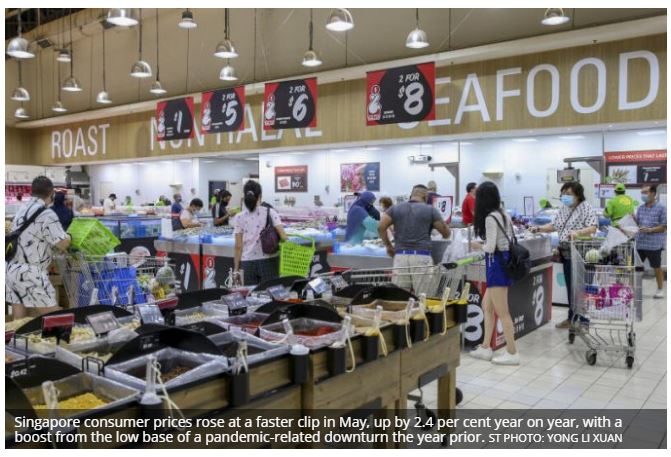Singapore consumer prices post 2.4% rise in May, a seven-year high
SINGAPORE consumer prices rose at a faster clip in May, up by 2.4 per cent year on year, with a boost from the low base of a pandemic-related downturn the year prior.
Headline inflation has now registered its highest level since May 2014. It was a pick-up from 2.1 per cent the month before, and also higher than economists’ median estimate of 2.2 per cent in a Bloomberg poll.
Core inflation stood at 0.8 per cent, rising from 0.6 per cent in April, according to data on Wednesday. Private-sector analysts had projected a print of 0.7 per cent.
Domestically, the ongoing Phase 3 (Heightened Alert) situation “could have an overall dampening effect on the pick-up in underlying inflation”, the Monetary Authority of Singapore (MAS) and Ministry of Trade and Industry (MTI) said in a joint statement.
That’s even as they reiterated that core inflation “will continue to gradually increase”, while all-items inflation should stay high in the near term and ease in the second half.
Inflation in May was driven by stronger price increases in services, private transport and accommodation, as well as a smaller decline in retail goods costs, they noted.
Barclays economist Brian Tan said that these figures may be inflated, as travel-related price changes had to be estimated, on a lack of reference data. Even so, core inflation is set to remain “well below its historical average of about 2 per cent”, he added in a flash note.
Led by a steeper rise in petrol prices, private road transport costs jumped 14.5 per cent year on year, up from 12.9 per cent in April.
Accommodation expenses ticked up by 0.9 per cent, against 0.7 per cent before, on a faster increase in housing rents.
The central bank uses core inflation, which excludes private transport and accommodation costs, as a gauge for its exchange rate-based monetary policy.
Services inflation came in at 1.4 per cent in May, against 1.1 per cent before, on cost increases for telecom services, point-to-point transport and health insurance.
Food inflation was unchanged from the month prior, at 1 per cent, as prepared food prices rose by 1.2 per cent and non-cooked food costs inched up 0.6 per cent.
Meanwhile, the prices of retail and other goods, as well as electricity and gas, fell at a slower pace than in April.
Retail and other goods costs slipped 0.8 per cent in May, against 1.1 per cent previously. That’s as a 4.1 per cent fall in the price of clothes and shoes offset the 2.4 per cent price increase in household durables.
Electricity and gas expenses were down 1.9 per cent year on year, shrinking from the 2.4 per cent fall in April. The MAS and MTI attributed this to a slowdown in the take-up of liberalised electricity market plans, and a stronger pick-up in gas prices.
They also affirmed their full-year forecast for core inflation to average zero to 1 per cent, with headline inflation to fall between 0.5 per cent and 1.5 per cent.
Source: https://www.businesstimes.com.sg/government-economy/singapore-consumer-prices-post-24-rise-in-may-a-seven-year-high


 English
English




